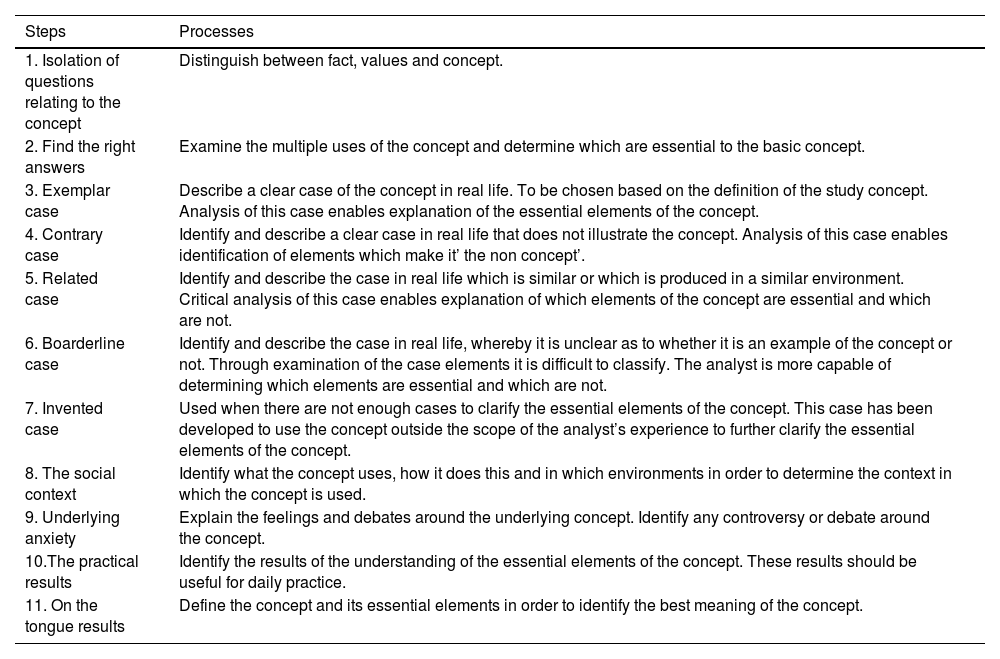Admission to an intensive care unit can cause sequelae to both patients and family members. In some countries, the use of diaries is a preventive action.
AimThis research proposes to critically examine the concept of ‘Intensive Care Unit Diary’ by analysing the current state of the scientific literature to develop a precise conception of this phenomenon in nursing practice, since there are multiple unknowns regarding its use and content.
MethodA bibliographic search was carried out in the PubMed, Cochrane Library, Scopus and CINAHL databases in January 2023. The terms used to search for their use and definitions in the databases included Nurse, Concept analysis, Family, Uci Diary, Patient Critical, Intensive Care Unit. We use Wilson’s concept analysis, later developed by Walker and Avant.
ResultsThe concept analysis shows that the ‘ICU Diary’ is a record made in colloquial language by health workers and relatives of the patient admitted to the intensive care unit. Aimed at the patient, with an empathic and reflective style, which offers a narrative of the process, daily life and the conduct or behaviour of the patient during his stay.
It is a therapeutic tool led by nurses accepted by patients, families and professionals. Its use benefits the recovery process, reducing post-traumatic stress in family members and patients. It favours communication and the bond between nurses, family members and patients, helping to express feelings and emotions.
ConclusionsThe concept of ‘UCI Diary’ is complex. Through Wilson’s model, a clarification of the concept has been achieved, creating a starting point for more precise research on this phenomenon and its effects on patients, family members, professionals and the health system.
Ingresar en una unidad de cuidados intensivos puede ocasionar secuelas tanto a pacientes como a familiares. En algunos países, el uso de diarios es una acción preventiva.
ObjetivoEsta investigación propone examinar críticamente el concepto de “Diario de Unidad de Cuidados Intensivos” mediante el análisis del estado actual de la literatura científica para desarrollar una concepción precisa de este fenómeno en la práctica enfermera, ya que existes múltiples incógnitas en cuanto al uso y contenido.
MétodoSe realizó una búsqueda bibliográfica en las bases de datos de PubMed, Cochrane Library, Scopus y CINAHL en enero de 2023. Los términos utilizados para buscar su uso y definiciones en las bases de datos incluyeron: enfermera, análisis de concepto, familia, diario UCI, paciente crítico, unidad de cuidados intensivos. Empleamos el análisis de concepto de Wilson, posteriormente desarrollado por Walker y Avant.
ResultadosEl análisis de concepto muestra que el “Diario de UCI” es un registro realizado en lenguaje coloquial por sanitarios y familiares del paciente ingresado en la unidad de cuidados intensivos. Dirigido al paciente, con estilo empático y reflexivo, que ofrece una narrativa del proceso, de la vida cuotidiana y de la conducta o comportamiento del paciente durante su estancia.
Es una herramienta terapéutica liderada por enfermeras aceptada por pacientes, familiares y profesionales. Su uso beneficia el proceso de recuperación, disminuyendo el estrés postraumático en familiares y pacientes. Favorece la comunicación y el vínculo entre enfermera, familiares y pacientes, ayudando a expresar sentimientos y emociones.
ConclusionesEl concepto de «diario de UCI» es complejo. Mediante el modelo de Wilson, se ha alcanzado una clarificación del concepto creando un punto de partida para realizar investigaciones más precisas sobre este fenómeno y sus efectos sobre los pacientes, los familiares, los profesionales y el sistema de salud.
Article
Diríjase al área de socios de la web de la SEEIUC, (https://seeiuc.org/mi-cuenta/iniciar-sesion/) y autentifíquese.








